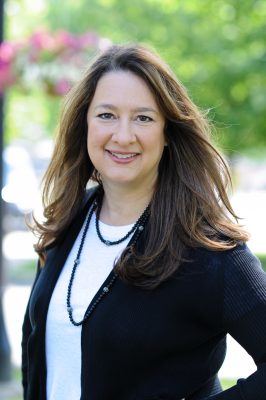Katz Looks to Take Leap from Council Seat to New Castle Supervisor

Lisa Katz had a decision to make last winter if she wanted to continue serving the town – run for a third council term on the New Castle Town Board or try to make the jump to supervisor.
After current Supervisor Ivy Pool decided in early February that she wasn’t running for re-election, Katz announced she and her three running mates would appear on the independent Unite New Castle line, with her leading the ticket.
She said her run for the Democratic nomination, which came after the town’s Democratic Committee announced its slate in late February, is more than opposition against the Form Based Code, a controversial zoning proposal designed to reinvigorate the downtown Chappaqua hamlet. It was to challenge the committee’s stranglehold on New Castle politics and provide voters with a choice.
Next week’s primary is the first in anyone’s memory for a town election. It will decide which four candidates – for supervisor, two four-year terms on the Town Board and the final two years of an unexpired board seat – will appear on two lines rather than one in November.
“So it’s really about giving access to other Democrats who want to run for that line, and we’re the first slate to do that in New Castle history and I’m hoping we’re not going to be the last,” said Katz, a lifelong Democrat who ran on the Republican line in her two successful Town Board runs in 2013 and 2017.
Opposition to the Form Based Code has played out during a series of sometimes tense public hearings from October through January, and has continued almost unabated on social media. Katz has been an outspoken dissenter on the board.
While there’s consensus that the downtown needs attention, she said the proposed code would fail to accomplish the goals of the 2017 Comprehensive Plan that sought to bring vitality to the hamlet.
Instead, Katz, 51, an elder care and estate planning attorney, said there should be carefully targeted revisions to the current zoning code that would allow town officials to work with and negotiate with property owners and developers to ensure that new development in the hamlet produces restaurants, entertainment and housing diversity to keep seniors in town and attract new families to the area who are not yet ready to buy a house.
A similar process was followed with the development of Chappaqua Crossing, which produced a mixture of affordable, workforce and market-rate units that has earned praise from around the county and beyond.
“It’s not really giving us a reason to stay in town, and what it is doing is basically giving a windfall to developers who will come in and build the largest, cheapest building that they can in order to reap the most profits, and taking real input to what will be built out of the hands of the Planning Board, the Zoning Board and the Architectural Review Board, and to me, that’s not okay,” Katz said.
Her plan would be to provide incentives for developers; for example, allowing an extra story on a building if they exceeded the 10 percent affordable housing threshold or bringing in the types of businesses sought by the community.
Ultimately, Katz said her administration would reach out to residents and create a vision for the downtown based on public input.
She also criticized the current Town Board majority for pressing ahead with the environmental review for the full 72-acre downtown study area despite having announced that it will concentrate implementing any zoning changes only to North Greeley Avenue. It will make rezoning other areas of downtown much too easy, Katz warned.
“A future Town Board can easily and quickly expand the application of the Form Based Code to the entire hamlet because the study would have already been done,” Katz said.
She continues to be a supporter of development centered predominantly in the hamlets. For Millwood, significant development would require a resolution of the decades-long sewers debate, which the town must continually work toward. Katz said she would also work to ensure the rural West End is protected from development.
However, Katz said her push to reconstitute the Millwood-West End Advisory Board will help make sure that those areas of town do not take a back seat to Chappaqua. She suggested the town schedule more programming and events for Millwood to bring people over to that side of town to increase the sense of community.
Katz said last year’s formation of the Council on Race and Equity did excellent work, and now it is up to town leaders to seek out different voices to promote diversity, equity and inclusion.
“One thing I value about my slate is that we are the most diverse in town history and it’s clearly a priority for me to ensure that all voices are not only heard but represented and respected,” she said.
Katz supports the Chap Line, a roughly mile-long pedestrian route that would connect Roaring Brook Road and downtown Chappaqua. However, much of the funding for the estimated $10 million project would have to be obtained through grants, government funding and donations.
After dealing with the pandemic and frayed tensions stemming from the Form Based Code debates, Katz said her mission is to unite residents and the town.
“I really want to bring that back throughout New Castle,” Katz said. “I want to make sure that we’re not just a town but a community. That is one of my biggest goals.”

Martin has more than 30 years experience covering local news in Westchester and Putnam counties, including a frequent focus on zoning and planning issues. He has been editor-in-chief of The Examiner since its inception in 2007. Read more from Martin’s editor-author bio here. Read Martin’s archived work here: https://www.theexaminernews.com/author/martin-wilbur2007/
